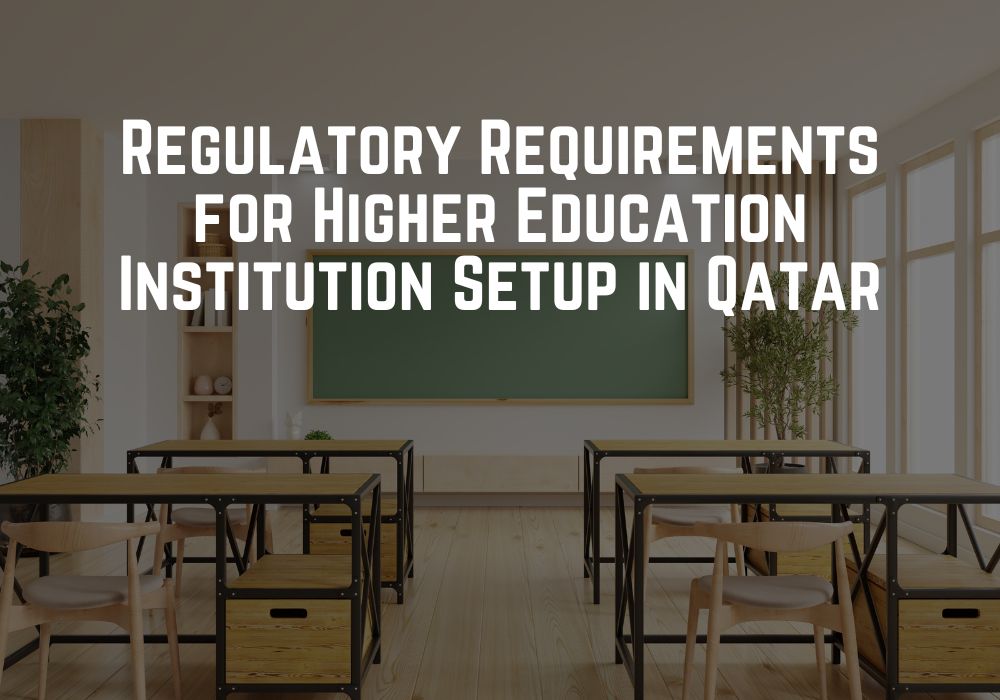Starting an educational business in Qatar presents a unique opportunity to contribute to a growing sector within a forward-thinking country. However, the journey to establishing such a venture begins with understanding the essentials of education business registration in Qatar. It is crucial to familiarize yourself with the specific requirements and processes involved in legally setting up your educational institution.
In Qatar, registering an education business involves navigating a structured legal framework. This includes obtaining the necessary licenses and permits and ensuring all your documentation aligns with local regulations. With the Ministry of Education and Higher Education playing a pivotal role, knowing how to engage with key governmental bodies can significantly impact your success. From private tutoring services to international schools, each type of educational venture has unique registration needs that must be addressed to ensure compliance.
Our comprehensive guide aims to simplify this process, offering a step-by-step walkthrough to help you effectively manage the requirements. We’ll provide valuable insights into minimizing delays, avoiding common pitfalls, and ensuring a smooth registration experience. By adhering to these guidelines, you set a solid foundation for your educational business to thrive in Qatar’s rich educational landscape.
Understanding the Essentials of Education Business Registration in Qatar
Overview of Business Registration Requirements in the Education Sector in Qatar
Starting an education business in Qatar is a promising venture, given the country’s emphasis on developing a robust educational framework. However, it requires understanding and complying with specific business registration requirements. Here’s what you need to know:
When considering education business registration in Qatar, it is crucial to understand the necessary licenses, permits, and documentation required to start your venture successfully. Ensuring that you have all the appropriate paperwork will not only facilitate a smooth registration process but also set your business up for future success.
Explanation of Necessary Licenses, Permits, and Documentation
To open an educational institution in Qatar, securing certain licenses and permits is essential. These include:
- Commercial Registration (CR): This is the primary step for any business in Qatar. It identifies your business legally and allows you to undertake educational activities.
- Trade License: Once you have a CR, the trade license gives you the official approval to conduct your business operations.
- Ministry of Education and Higher Education Approval: Specific to education businesses, you must obtain approval from this ministry to ensure your educational programs meet the national standards.
- Building Permit and Safety Certificates: These are required to ensure your institution’s premises meet the safety and infrastructure standards set by Qatari regulations.
- Additional Permits: Depending on the type of educational services offered (e.g., primary schooling, language courses, etc.), you might need additional certification or accreditations tailored to your offerings.
Step-by-Step Guide on Navigating Qatar’s Legal Framework for Educational Ventures
Here is a simple guide to help you navigate the legal framework when establishing your education business in Qatar:
- Choose Your Business Structure: Decide whether your institution will be a sole proprietorship, partnership, or company. This affects your tax obligations and management structure.
- Register Your Business Name: Ensure your chosen name is unique and not infringing on any existing businesses. This is done through the Ministry of Commerce and Industry.
- Obtain Commercial Registration: Submit an application for Commercial Registration at the Ministry of Commerce and Industry. This will include details of the owners, company structure, and business objectives.
- Secure Your Trade License: After your CR is approved, apply for a trade license from the municipality where your business will operate. This involves inspection and approval of your educational facilities.
- Obtain Ministry of Education and Higher Education Approval: Submit your educational curriculum and facility plans to get necessary endorsements. This step ensures local educational standards are met.
- Finalize Additional Certifications: Depending on the services (like offering advanced or specialized courses), obtain further certificates as required.
- Set Up Financial Accounts: Open a corporate bank account in Qatar to manage finances efficiently and adhere to financial regulations.
- Recruit Qualified Staff: Hire educators and administrative staff who meet the professional standards set by Qatar’s education ministry.
- Promote and Launch Your Institution: Once all regulatory requirements are met, launch your educational venture with marketing to attract students.
Emphasize the Importance of Adhering to Local Regulations for Business Success
Compliance with local regulations is not just a legal necessity but a foundation for sustainable business success. Here’s why it’s essential:
- Legal Compliance: Adhering to regulations prevents legal issues and allows uninterrupted operation of your educational services.
- Quality Assurance: Meeting the standards set by the Ministry of Education and Higher Education ensures the quality and credibility of the education provided.
- Building Trust: Compliance fosters trust with students, parents, and the community, positioning your institution as a reliable and professional organization.
- Avoiding Penalties: Non-compliance can lead to fines or the shutdown of your business, thus adhering to regulations mitigates these risks.
- Enhancing Reputation: A compliant business aligns with the national education agenda, enhancing its reputation and attracting more clients.
In summary, understanding and complying with the business registration process for education in Qatar is pivotal. Adequate preparation and strict adherence to legal requirements not only facilitate the successful establishment of an education business but also contribute significantly to its long-term sustainability and success.
Looking to Start an Educational Institution in Qatar? Contact Us!

Navigating the Registration Process for Educational Institutions in Qatar
Detailed Process and Guidelines for Registering an Education Business
Starting an educational institution in Qatar can be an exciting endeavor, and understanding the registration process is crucial for a smooth experience. This guide provides insight into the steps and guidelines required for successful education business registration in Qatar.
Insight into the Various Types of Educational Businesses and Their Specific Registration Needs
Educational businesses in Qatar can take many forms, from nurseries and primary schools to vocational training centers and higher education institutions. Each type of educational business comes with its own set of registration requirements:
- Nurseries and Kindergartens: These typically require approvals from the Ministry of Education and Higher Education. Safety and health permits are essential, reflecting the emphasis on child welfare.
- Primary and Secondary Schools: Approval from the Ministry of Education and Higher Education is mandatory. Schools must also meet curriculum requirements and ensure facilities meet specific standards.
- Vocational and Training Centers: Certification from relevant bodies is necessary, with a focus on the quality of training programs offered.
- Higher Education Institutions: These require the most comprehensive evaluations, including curriculum accreditation and faculty qualifications.
Understanding the type of educational business you want to register will help streamline the registration process by ensuring you meet all specific requirements for your chosen category.
Highlight Key Government Bodies Involved in the Registration Process
To ensure compliance and successfully register your education business in Qatar, it’s important to work with the right government bodies. These key authorities play crucial roles in the registration process:
- Ministry of Education and Higher Education: This is the primary body responsible for overseeing educational standards, reviewing applications, and granting permissions to operate educational institutions.
- Ministry of Commerce and Industry: This entity manages the initial business registration and ensures that the business activity is properly classified.
- Municipal Authorities: Local municipalities confirm that the premises of educational institutions comply with zoning laws and building safety codes.
- Labor Department: This body ensures compliance with employment laws, including the recruitment and retention of qualified staff.
Establishing clear communication channels with these bodies will reduce the chances of misunderstandings and lead to a more efficient registration process.
Tips for Minimizing Delays and Ensuring a Smooth Registration Experience in Qatar
The registration process can be complex, and potential delays can occur. Here are some strategies to enhance your registration experience:
- Thoroughly Research Requirements: Before starting the registration process, gather comprehensive information on all legal and procedural requirements specific to your business type.
- Prepare All Necessary Documentation: Ensure all documents, such as business plans, facility layouts, and curriculum details, are complete and accurately reflect your educational venture.
- Establish a Timeline: Anticipate the time required for different stages of approval and set realistic deadlines to help avoid last-minute complications.
- Engage Local Experts: Consider hiring local legal experts or consultants familiar with the education sector in Qatar to facilitate communication and guide you through the process.
- Maintain Open Communication: Keep in constant contact with relevant authorities to receive updates and promptly address any issues or requests for additional information.
- Utilize Online Resources: Many government services and approvals can be managed online, speeding up the process and improving efficiency.
Conclusion
Setting up a higher education institution in Qatar is a complex process that requires a thorough understanding of the country’s regulatory environment and educational landscape. The Ministry of Education and Higher Education oversees the process, and prospective founders must adhere to guidelines and secure necessary licenses and permits. The location of the institution must be chosen carefully, considering infrastructure needs and proximity to transportation hubs and student amenities. Securing funding and developing a robust financial plan are also crucial components of launching a successful higher education institution in Qatar.
A comprehensive guide will equip entrepreneurs with the knowledge and strategic insights necessary for a higher education institution setup in Qatar, ensuring they are well-prepared to make informed decisions at every stage. This proactive approach minimizes delays and ensures a smooth education business registration experience in Qatar.
Understanding the diverse types of educational enterprises and their specific registration needs is crucial for entrepreneurs to tailor their approach accordingly. Engaging with key government bodies and adhering to their guidelines can expedite the registration process and enhance the credibility and reputation of the educational venture.
Adhering to local regulations is essential for the long-term success and growth of any educational institution. Aligning with Qatar’s educational goals and standards contributes positively to the country’s educational landscape.
Looking to Start an Educational Institution in Qatar? Contact Us!






